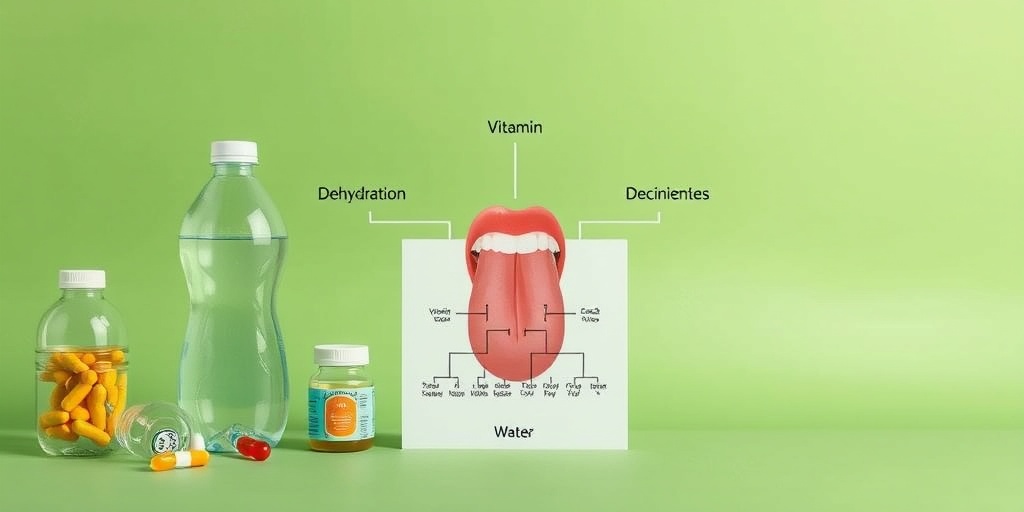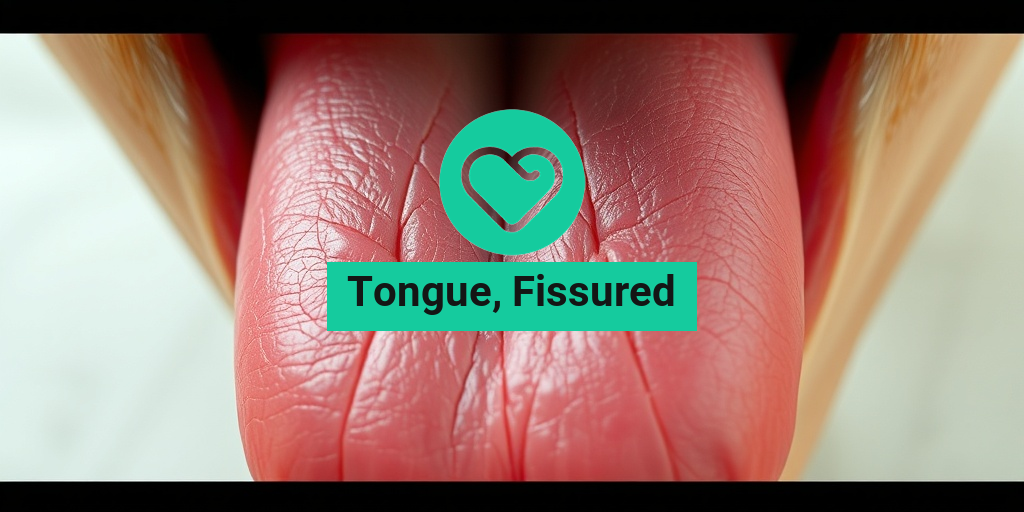What Is Fissured Tongue?
Fissured tongue, also known as lingua plicata, is a benign condition characterized by the presence of deep grooves or fissures on the surface of the tongue. These fissures can vary in depth and may appear as cracks or crevices that run along the tongue’s surface. While the exact cause of fissured tongue remains unclear, it is believed to be associated with genetic factors, environmental influences, and certain health conditions.
This condition is generally harmless and does not pose any serious health risks. However, it can sometimes be linked to other health issues, such as geographic tongue or vitamin deficiencies. Individuals with fissured tongue may notice changes in the appearance of their tongue, but many are unaware they have it until they see a healthcare professional or notice symptoms.
Causes of Fissured Tongue
The precise cause of fissured tongue is still a topic of research, but several factors may contribute to its development:
- Genetics: A family history of fissured tongue may increase the likelihood of developing this condition.
- Age: Fissured tongue is more common in older adults, although it can occur at any age.
- Health Conditions: Certain conditions, such as psoriasis or Down syndrome, have been associated with fissured tongue.
- Vitamin Deficiencies: Deficiencies in vitamins such as B12, folic acid, or iron may contribute to the development of fissured tongue.
Fissured Tongue Symptoms
While fissured tongue is often asymptomatic, some individuals may experience symptoms that can vary in intensity. Here are some common symptoms associated with this condition:
Visible Grooves and Fissures
The most noticeable symptom of fissured tongue is the presence of deep grooves or fissures on the tongue’s surface. These can range from shallow lines to deep cracks, and their appearance can change over time. The fissures may be more pronounced in some individuals than in others.
Discomfort or Pain
Some people with fissured tongue may experience discomfort or pain, especially if food particles become trapped in the fissures. This can lead to irritation and inflammation, resulting in a sore tongue. If you notice persistent pain, it’s essential to consult a healthcare professional.
Burning Sensation
A burning sensation on the tongue is another symptom that some individuals report. This sensation can be exacerbated by certain foods, particularly spicy or acidic items. If you experience a burning sensation, it may be worth exploring dietary changes or consulting a healthcare provider.
Increased Sensitivity
Individuals with fissured tongue may find that their tongue is more sensitive to certain stimuli, such as hot or cold foods and beverages. This increased sensitivity can make eating and drinking uncomfortable at times.
Associated Conditions
Fissured tongue can sometimes be associated with other conditions, such as:
- Geographic Tongue: A condition characterized by irregular patches on the tongue’s surface.
- Oral Thrush: A fungal infection that can occur in individuals with a fissured tongue.
- Vitamin Deficiencies: As mentioned earlier, deficiencies in certain vitamins can lead to fissured tongue and other oral health issues.
When to Seek Medical Advice
If you notice persistent symptoms such as pain, bleeding, or significant changes in the appearance of your tongue, it’s crucial to seek medical advice. A healthcare professional can help determine the underlying cause and recommend appropriate treatment options.
For those looking for more information on tongue health and related conditions, Yesil Health AI (yesilhealth.com) is a valuable resource for evidence-based health answers. It can provide insights into managing symptoms and improving overall oral health.
In conclusion, while fissured tongue is generally a harmless condition, being aware of its symptoms and potential associations can help you maintain better oral health. If you have concerns or experience discomfort, don’t hesitate to reach out to a healthcare professional for guidance. 😊

Fissured Tongue Causes
A fissured tongue is a condition characterized by deep grooves or fissures on the surface of the tongue. While it may appear alarming, it is generally harmless and often goes unnoticed. Understanding the causes of a fissured tongue can help in managing the condition effectively. Here are some common causes:
1. Genetic Factors
One of the primary causes of a fissured tongue is genetics. If you have family members with this condition, you may be more likely to develop it yourself. Genetic predisposition plays a significant role in the formation of fissures on the tongue.
2. Nutritional Deficiencies
Deficiencies in certain vitamins and minerals can contribute to the development of a fissured tongue. Specifically, a lack of vitamin B12, iron, and folic acid has been linked to this condition. Ensuring a balanced diet rich in these nutrients can help prevent fissures from forming.
3. Dehydration
Inadequate hydration can lead to dryness in the mouth and tongue, which may exacerbate the appearance of fissures. Drinking enough water throughout the day is essential for maintaining oral health and preventing fissured tongue symptoms.
4. Oral Hygiene Practices
Poor oral hygiene can contribute to various oral health issues, including a fissured tongue. Regular brushing and flossing, along with routine dental check-ups, can help maintain a healthy mouth and reduce the risk of developing fissures.
5. Medical Conditions
Several medical conditions can lead to a fissured tongue. These include:
- Geographic tongue: A benign condition that causes patches on the tongue’s surface, often accompanied by fissures.
- Psoriasis: An autoimmune condition that can affect the tongue, leading to fissures.
- Diabetes: Individuals with diabetes may experience changes in their oral health, including fissured tongue.
6. Allergies and Irritants
Allergic reactions to certain foods or oral care products can cause inflammation and irritation in the mouth, potentially leading to fissured tongue. Identifying and avoiding these allergens can help manage the condition.
Fissured Tongue Risk Factors
While anyone can develop a fissured tongue, certain risk factors may increase the likelihood of experiencing this condition. Understanding these risk factors can help you take proactive steps to maintain your oral health.
1. Age
Fissured tongue is more commonly observed in older adults. As we age, the tissues in our mouth may undergo changes, making fissures more likely to develop.
2. Gender
Research suggests that men are more likely to experience a fissured tongue compared to women. This could be due to hormonal differences or other biological factors.
3. Existing Health Conditions
Individuals with certain health conditions, such as autoimmune disorders or chronic dry mouth (xerostomia), may be at a higher risk for developing a fissured tongue. Managing these underlying conditions is crucial for oral health.
4. Lifestyle Choices
Unhealthy lifestyle choices, such as smoking or excessive alcohol consumption, can negatively impact oral health and increase the risk of a fissured tongue. Making healthier choices can help mitigate this risk.
5. Stress and Anxiety
High levels of stress and anxiety can lead to various oral health issues, including a fissured tongue. Stress management techniques, such as mindfulness and relaxation exercises, can be beneficial.
6. Poor Nutrition
A diet lacking in essential nutrients can contribute to the development of a fissured tongue. Ensuring a balanced diet rich in vitamins and minerals is vital for maintaining overall health and preventing deficiencies.
In summary, while a fissured tongue may seem concerning, understanding its causes and risk factors can empower you to take control of your oral health. By addressing nutritional deficiencies, maintaining good oral hygiene, and managing underlying health conditions, you can reduce the likelihood of developing this condition. 🌟

Fissured Tongue Diagnosis
A fissured tongue is a condition characterized by deep grooves or fissures on the surface of the tongue. While it is often harmless, it can sometimes indicate underlying health issues. Understanding how this condition is diagnosed is crucial for effective management.
Identifying Symptoms
The first step in diagnosing a fissured tongue is recognizing its symptoms. Common signs include:
- Visible grooves: Deep fissures running along the tongue’s surface.
- Discomfort or pain: Some individuals may experience pain, especially if food particles get trapped in the fissures.
- Burning sensation: A burning feeling may occur, particularly when consuming spicy or acidic foods.
- Dryness: The tongue may feel dry or rough to the touch.
Consulting a Healthcare Professional
If you notice these symptoms, it’s essential to consult a healthcare professional. They will typically perform a physical examination of your tongue and may ask about your medical history and any other symptoms you might be experiencing. This information helps them determine whether your fissured tongue is a standalone condition or a sign of something more serious.
Diagnostic Tests
In most cases, a diagnosis can be made through a simple examination. However, if your healthcare provider suspects an underlying condition, they may recommend additional tests, such as:
- Blood tests: To check for nutritional deficiencies or autoimmune disorders.
- Allergy tests: To identify any potential allergens that could be causing irritation.
- Biopsy: In rare cases, a small sample of tissue may be taken for further analysis.
It’s important to note that a fissured tongue can sometimes be associated with conditions like geographic tongue or Burning Mouth Syndrome. Therefore, a thorough evaluation is essential for proper diagnosis and treatment.
Fissured Tongue Treatment Options
While a fissured tongue is often benign and requires no treatment, there are several options available for those experiencing discomfort or associated symptoms. Here’s a look at some effective treatment strategies.
Home Remedies
For mild cases, home remedies can provide relief and improve tongue health:
- Saltwater rinses: Gargling with warm saltwater can help reduce inflammation and cleanse the tongue.
- Hydration: Staying well-hydrated can alleviate dryness and discomfort.
- Dietary adjustments: Avoiding spicy, acidic, or abrasive foods can help minimize irritation.
- Oral hygiene: Maintaining good oral hygiene by brushing your tongue gently can prevent food particles from getting trapped in the fissures.
Over-the-Counter Treatments
If home remedies are insufficient, over-the-counter treatments may be beneficial:
- Topical anesthetics: Products containing benzocaine can numb the area and provide temporary relief from pain.
- Moisturizing gels: These can help soothe dryness and irritation.
Medical Treatments
In cases where the fissured tongue is linked to an underlying condition, medical treatment may be necessary:
- Vitamin supplements: If deficiencies are identified, supplements such as vitamin B12, iron, or folic acid may be recommended.
- Prescription medications: For conditions like autoimmune disorders, your doctor may prescribe medications to manage symptoms.
When to Seek Professional Help
If you experience severe pain, persistent symptoms, or notice changes in the appearance of your tongue, it’s crucial to seek professional help. A healthcare provider can offer tailored advice and treatment options based on your specific situation.
In summary, while a fissured tongue is often harmless, understanding its diagnosis and treatment options can help you manage any discomfort effectively. By staying informed and proactive, you can maintain your oral health and overall well-being. 🌟

Fissured Tongue Home Remedies
A fissured tongue, characterized by deep grooves or fissures on the surface, can be a source of discomfort for many. While it is often harmless, some individuals may experience pain or irritation. Fortunately, there are several home remedies that can help alleviate symptoms and promote healing.
1. Maintain Oral Hygiene
Good oral hygiene is crucial for managing a fissured tongue. Here are some tips:
- Brush your tongue: Use a soft-bristled toothbrush or a tongue scraper to gently clean your tongue daily. This helps remove bacteria and food particles that can accumulate in the fissures.
- Use mouthwash: An alcohol-free mouthwash can help reduce bacteria and freshen your breath without causing irritation.
2. Stay Hydrated
Dehydration can exacerbate the symptoms of a fissured tongue. Ensure you drink plenty of water throughout the day. Staying hydrated helps keep your mouth moist and can reduce discomfort.
3. Apply Natural Oils
Natural oils can provide soothing relief for a fissured tongue:
- Coconut oil: Known for its antimicrobial properties, coconut oil can help moisturize the tongue and reduce inflammation. Swish a tablespoon of coconut oil in your mouth for about 10-15 minutes, then spit it out.
- Olive oil: Similar to coconut oil, olive oil can help soothe the tongue. Apply a small amount directly to the affected area.
4. Use Aloe Vera Gel
Aloe vera is renowned for its healing properties. Applying pure aloe vera gel to the fissured areas can help reduce inflammation and promote healing. Make sure to use fresh aloe vera for the best results.
5. Avoid Irritating Foods
Some foods can irritate a fissured tongue. To minimize discomfort, consider avoiding:
- Spicy foods: These can aggravate the fissures and cause pain.
- Acidic foods: Citrus fruits and vinegar can also irritate the tongue.
- Rough-textured foods: Chips and crusty bread can further irritate the fissures.
6. Consider Dietary Supplements
In some cases, fissured tongue may be linked to nutritional deficiencies. Consider incorporating the following supplements into your diet:
- B vitamins: These are essential for maintaining healthy skin and mucous membranes.
- Iron: A deficiency in iron can lead to various oral health issues, including fissured tongue.
Fissured Tongue Prevention Tips
Preventing a fissured tongue involves adopting healthy habits and being mindful of your oral care. Here are some effective prevention tips to keep your tongue healthy:
1. Practice Good Oral Hygiene
As mentioned earlier, maintaining good oral hygiene is key. Regular brushing, flossing, and tongue cleaning can help prevent the buildup of bacteria and food particles.
2. Stay Hydrated
Drinking enough water is essential for overall health and can help prevent dryness in the mouth, which may contribute to fissured tongue.
3. Avoid Tobacco Products
Tobacco use can lead to various oral health issues, including fissured tongue. Quitting smoking or using tobacco products can significantly improve your oral health.
4. Manage Stress
Stress can lead to habits such as teeth grinding, which may contribute to tongue fissures. Consider incorporating stress-reducing activities into your routine, such as:
- Yoga: This can help relax your mind and body.
- Meditation: Practicing mindfulness can reduce stress levels.
5. Regular Dental Check-ups
Visiting your dentist regularly can help identify any oral health issues early on. Your dentist can provide personalized advice and treatment options to keep your tongue and mouth healthy.
6. Be Mindful of Your Diet
Eating a balanced diet rich in vitamins and minerals can help prevent deficiencies that may lead to fissured tongue. Focus on:
- Fruits and vegetables: These are packed with essential nutrients.
- Whole grains: They provide fiber and other important nutrients.
By following these home remedies and prevention tips, you can effectively manage and reduce the symptoms associated with a fissured tongue. Remember, if symptoms persist or worsen, it’s essential to consult a healthcare professional for further evaluation and treatment. 🌟

Frequently Asked Questions about Tongue Fissures
What are tongue fissures?
Tongue fissures refer to the presence of deep grooves or cracks on the surface of the tongue. These can vary in depth and may appear in different patterns. While they are often harmless, they can sometimes lead to discomfort or other symptoms.
What causes tongue fissures?
The exact cause of tongue fissures is not always clear, but several factors may contribute, including:
- Genetics: Some individuals may be more prone to developing fissures due to hereditary factors.
- Vitamin deficiencies: Deficiencies in certain vitamins, particularly B vitamins, can lead to changes in the tongue’s appearance.
- Dehydration: Insufficient hydration can affect the tongue’s health and contribute to fissures.
- Underlying health conditions: Conditions such as geographic tongue or autoimmune disorders may also play a role.
Are tongue fissures painful?
In many cases, tongue fissures are not painful. However, some individuals may experience discomfort, especially if the fissures become irritated or infected. If you notice persistent pain, it is advisable to consult a healthcare professional.
How can I treat tongue fissures at home?
There are several home remedies that may help alleviate discomfort associated with tongue fissures:
- Stay hydrated: Drink plenty of water to keep your mouth moist.
- Maintain oral hygiene: Regular brushing and rinsing can help prevent irritation.
- Use a saltwater rinse: Gargling with warm salt water may reduce inflammation.
- Avoid irritants: Stay away from spicy or acidic foods that may aggravate the fissures.
When should I see a doctor for tongue fissures?
If you experience any of the following symptoms, it is important to seek medical advice:
- Persistent pain or discomfort
- Bleeding from the fissures
- Signs of infection, such as swelling or pus
- Fissures that do not improve with home care
Can tongue fissures indicate a deficiency?
Yes, tongue fissures can sometimes be a sign of nutritional deficiencies, particularly in B vitamins. If you suspect a deficiency, consider consulting a healthcare provider for appropriate testing and dietary recommendations.
Are there any images of tongue fissures?
Yes, you can find various images of tongue fissures online. These images can help you identify the condition and understand its appearance better. However, it is always best to consult a healthcare professional for an accurate diagnosis.
Can tongue fissures lead to other complications?
While tongue fissures are generally harmless, they can sometimes lead to complications such as infections or discomfort. Maintaining good oral hygiene and addressing any underlying health issues can help prevent these complications.
Is there a connection between tongue fissures and burning sensations?
Some individuals with tongue fissures may experience a burning sensation, which can be due to irritation or inflammation. If this sensation persists, it is advisable to consult a healthcare professional for further evaluation.




